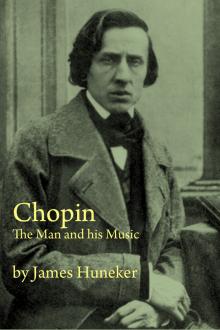Haydn - J. Cuthbert Hadden (ebook audio reader txt) 📗

- Author: J. Cuthbert Hadden
Book online «Haydn - J. Cuthbert Hadden (ebook audio reader txt) 📗». Author J. Cuthbert Hadden
Material Advantages
Haydn had no self-pity: why should we pity him? He had free quarters at the palace, with liberty to enjoy the company of his wife when she chose to favour him--an event of rare occurrence. His salary was raised from time to time. The old prince, his first employer, paid him 400 florins; his successor increased the amount first to 600 and then to 782 florins (78 pounds); and finally he had 1400 florins, which last sum was continued to him as a pension when he left the Esterhazy service. Although money had a much higher purchasing value in those days, the figures here quoted do not seem princely when we consider the extent and nature of Haydn's duties, but to a man of Haydn's simple tastes they would appear ample enough. At least, they would save him from lying on straw and drinking bad whisky, which Wagner regarded as among the things that are inimical to the creative genius.
Artistic Advantages
These were the material advantages of the Eisenstadt appointment. The artistic advantages were even more important, especially to a young and inexperienced artist who, so far, had not enjoyed many opportunities of practically testing his own work. Haydn had a very good band always at his disposal, the members of which were devoted to him. If he wrote part of a symphony over-night he could try it in the morning, prune, revise, accept, reject. Many a young composer of to-day would rejoice at such an opportunity, as indeed Haydn himself rejoiced at it. "I not only had the encouragement of constant approval," he says, speaking of this period of his career, "but as conductor of an orchestra I could make experiments, observe what produced an effect and what weakened it, and was thus in a position to improve, alter, make additions and omissions, and be as bold as I pleased."
Some Disadvantages
No doubt there were some disadvantages in counterpoise. After the gay life of Vienna, Eisenstadt must have been dull enough, and there is plenty of evidence to show that the young artist occasionally fell into the dumps. In one letter he complains that he "never can obtain leave, even for four-and-twenty hours, to go to Vienna." In another he writes: "I am doomed to stay at home. What I lose by so doing you can well imagine. It is indeed sad always to be a slave, but Providence wills it so. I am a poor creature, plagued perpetually by hard work, and with few hours for recreation." Haydn clearly recognized the necessities of the artist. A quiet life is all very well, but no man ever yet greatly touched the hearts of men if he kept himself too strictly segregated from his kind. Music, like every other art, would perish in a hot-house. Reckon up to-day the composers who are really a force in the emotional life of the people, and ask which of them was reared in the serene, cold air of the academies. A composer to be great must live with his fellows, and open his soul to human affluences. "I was cut off from the world," says Haydn. "There was no one to confuse or torment me, and I was forced to become original." But his originality was that of an active mind working upon material already stored, and the store had to be replenished in occasional excursions, all too few, from the palace.
The Eisenstadt appointment, then, provided for Haydn's material wants, and gave him opportunities for the peaceful pursuit of his studies, for experiment and self-criticism. He was treated with great consideration by the Esterhazys, and, menial or not, he lived on their bounty and in the friendliest relations with them.
Capellmeister Werner
From his agreement with Prince Esterhazy it will have been gathered that, though virtually entrusted with the direction of the Eisenstadt musical establishment, Haydn was really under the control of an old official. Such arrangements seldom work well. The retention of Joseph Werner was presumably due to the thoughtful kindness of his noble patron, but it was bound to lead to awkward situations. Werner had served the Esterhazys for thirty-two years, and could not be expected to placidly accept his supersession by a young and as yet almost unknown musician. True, he was not a very distinguished man himself. He had composed a large amount of music, chiefly sacred, including thirty-nine masses and twelve "Oratorios for Good Friday," besides some grotesque pieces intended as burlesques of the musical life of Vienna. Not one of his works has any real musical value; but, as is usually the case with the talent which stops short of genius, he thought a great deal of himself, and was inclined to look down upon Haydn as an interloper, unskilled in that rigid counterpoint which was the "heaven's law" of the old-time composer. Indeed, he described his associate as "a mere fop" and "a scribbler of songs."
A Posthumous Tribute
It is but fair to Haydn to say that, if he did not suffer his nominal superior gladly, he at least treated him with respect and a certain deference. He did more. Werner died in 1766, having thus seen only five years of the new order of things, but Haydn's regard for his memory was such that, so late as 1804, he published six of his fugues arranged as string quartets, "out of sincere esteem for this celebrated master." A kindness of heart and a total absence of professional jealousy characterized Haydn throughout his whole career, and never more than in this action.
Esterhazy "the Magnificent"
The composer had been rather less than a twelvemonth in his service when Prince Paul Anton died on the 18th of March 1762. He was succeeded by his brother Nicolaus, a sort of glorified "Grand Duke" of Chandos, who rejoiced in the soubriquet of "The Magnificent." He loved ostentation and glitter above all things, wearing at times a uniform bedecked with diamonds. But he loved music as well. More, he was a performer himself, and played the baryton, a stringed instrument not unlike the viola-da-gamba, in general use up to the end of the eighteenth century. Haydn naturally desired to please his prince, and being perpetually pestered to provide new works for the noble baryton player, he thought it would flatter him if he himself learnt to handle the baryton. This proved an unfortunate misreading of "The Magnificent's" character, for when Haydn at length made his debut with the instrument, the prince lost no time in letting him understand that he disapproved of such rivalry. An amusing story is told of Kraft, the Eisenstadt 'cellist, at this time, who occasionally played the second baryton. Kraft presented the prince with a composition into which he had introduced a solo for himself as second baryton. The prince asked to see the part, and proceeded to try it over. Coming to a difficult passage, he exclaimed indignantly: "For the future, write solos only for my part; it is no credit to you to play better than I; it is your duty."
Compositions for Baryton
Haydn, so far as we can make out, never essayed the baryton again, but he wrote a surprising amount of music for it, considering its complicated mechanism and the weakness of its tone. In the catalogue of his works there are no fewer than 175 compositions for the instrument--namely, six duets for two barytons, twelve sonatas for baryton and violoncello, twelve divertimenti for two barytons and bass, and 125 divertimenti for baryton, viola and violoncello; seventeen so-called "cassations"; and three concertos for baryton, with accompaniment of two violins and bass. There is no need to say anything about these compositions, inasmuch as they have gone to oblivion with the instrument which called them into being. At the best they can never have been of much artistic importance.
A Reproval
A new epoch began at Eisenstadt with the rule of Prince Nicolaus. He was a man of unbounded energy himself, and he expected everybody in his service to be energetic too. There is nothing to suggest that Haydn neglected any of his routine duties, which certainly gave him abundant opportunity to "break the legs of time," but once, at least--in 1765--his employer taxed him with lack of diligence in composition, as well as for failing to maintain the necessary discipline among the musicians under his charge. It is likely enough that Haydn was not a rigid disciplinarian; but it must have been a mere whim on the part of Prince Nicolaus to reprove him on the score of laziness in composing. In any case, it seems to have been only a solitary reproof. There is no evidence of its having been repeated, and we may assume that even now it was not regarded as a very serious matter, from the fact that three weeks after the prince was requesting his steward to pay Haydn 12 ducats for three new pieces, with which he was "very much pleased."
Operettas
Life at Eisenstadt moved on in "calm peace and quiet," but now and again it was stirred into special activity, when Haydn had to put forth his efforts in various new directions. Such an occasion came very early in his service of Prince Nicolaus, when that pompous person made triumphant entry into Eisenstadt. The festivities were on a regal scale and continued for a whole month. A company of foreign players had been engaged to perform on a stage erected in the large conservatory, and Haydn was required to provide them with operettas. He wrote several works of the kind, one of which, "La Marchesa Nepola," survives in the autograph score. Later on, for the marriage of Count Anton, the eldest son of Prince Nicolaus, in 1763, he provided a setting of the story which Handel had already used for his "Acis and Galatea." This work, which was performed by the Eisenstadt Capelle, with the orchestra clad in a new uniform of crimson and gold, bore the name of "Acide e Galatea." Portions of the score still exist--a section of the overture, four arias, and a finale quartet. The overture is described as being "in his own style, fresh and cheerful, foreshadowing his symphonies. The songs are in the Italian manner, very inferior in originality and expression to Handel's music; the quartet is crude in form and uninteresting in substance." [See Miss Townsend's Haydn, p. 44.]
It would seem rather ungracious, as it would certainly be redundant to discuss these "occasional" works in detail. For one thing, the material necessary to enable us to form a correct estimate of Haydn's powers as a dramatic composer is wanting. The original autograph of "Armida," first performed in 1783, is, indeed, preserved. "Orfeo ed Euridice," written for the King's Theatre in the Haymarket in 1791, but never staged, was printed at Leipzig in 1806, and a fair idea of the general style of the work may be obtained from the beautiful air, "Il pensier sta negli oggetti," included in a collection entitled "Gemme d'Antichita." But beyond these and the fragments previously mentioned, there is little left to represent Haydn as a composer of opera, the scores of most of the works written expressly for Prince Esterhazy having been destroyed when the prince's private theatre was burned down in 1779. What Haydn would have done for opera if he had devoted his serious attention to it at any of the larger theatres it is, of course, impossible to say. Judging from what has survived of





Comments (0)